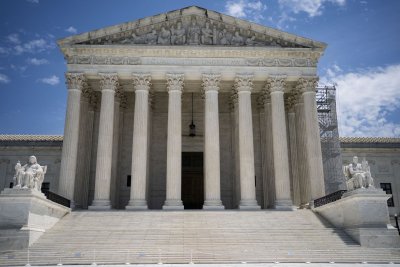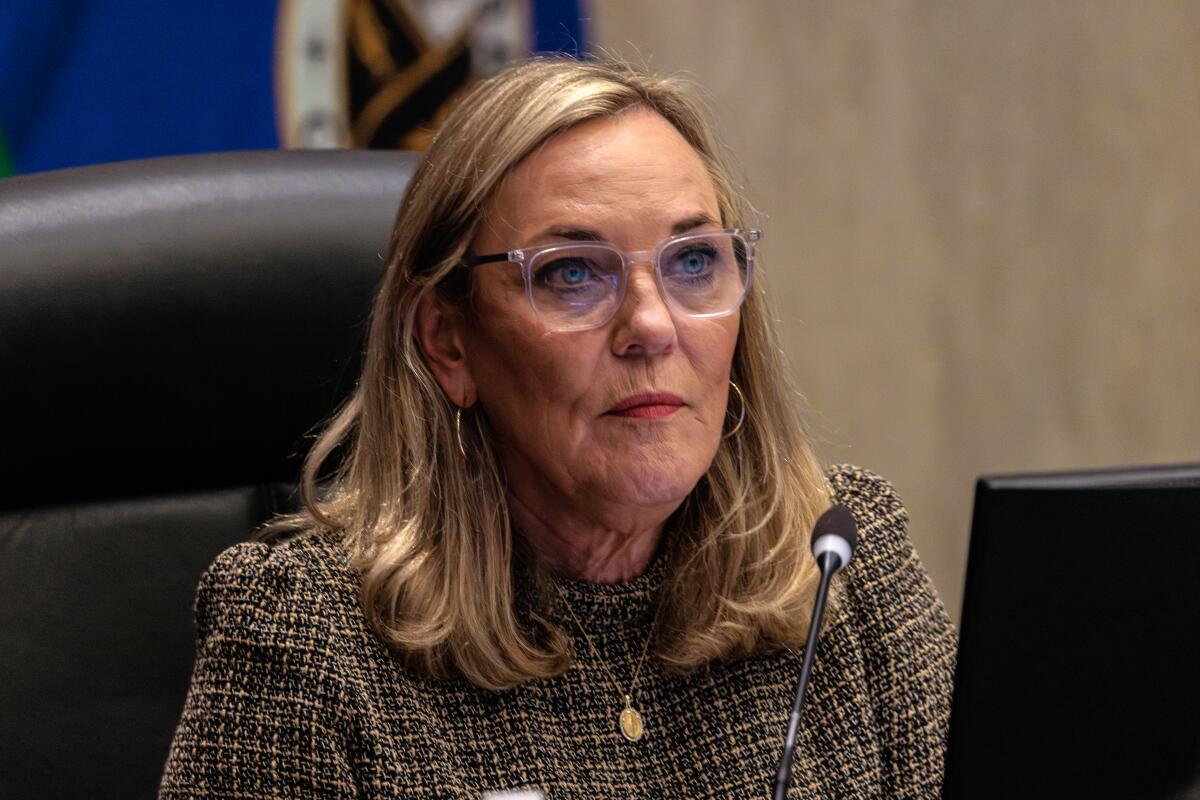Contributor: Newsom’s cynical redistricting ploy should be rejected by voters
Gov. Gavin Newsom’s political ambitions have reached a new low. In his efforts to look like a “fighter” ahead of a potential run for the presidency in 2028, he’s willing to ignore democratic rules in pursuit of political aims, setting aside the state’s independent redistricting system to counter Texas Republicans’ proposed partisan gerrymander. Newsom and his allies want to maximize the number of California Democrats elected to Congress in next year’s midterm elections.
In 2008 and 2010, California voters passed ballot initiatives that gave the power to draw the state’s legislative and congressional district lines to the California Citizens Redistricting Commission, a 14-person independent body composed of five Democrats, five Republicans and four people who are registered with neither of the two major parties. Potential commissioners go through an extensive vetting and selection process (which the state Legislature participates in) and are prohibited from many forms of political activism, including donating to candidates, running for office or working for elected officials.
Since the latest redistricting, in 2021 — triggered as usual by the constitutionally mandated decennial census — the map crafted by the commission has survived legal and political challenges, and the current districts are set to be in place through the next round of redistricting in 2031.
Now Newsom wants to prematurely redraw the lines and craft his own partisan gerrymander for the November 2026 midterm elections, wresting control of the process away from the commission and giving it instead to the Democratic majority in the state Legislature. Last week, Newsom confirmed that he will call a special election to get voter approval for this end-run around the commission, but even dressed up with a vote, this is cynical politics, not democracy, at work.
Newsom’s excuse is the sudden partisan redistricting Texas Gov. Greg Abbott and President Trump are backing to increase the number of Republicans elected to Congress from that state, and in turn, to enhance the party’s chances to retain control of the U.S. House of Representatives.
California Assembly Speaker Robert Rivas (D-Hollister) calls the Texas action a “Trumpian power grab,” and Newsom assails it as the “rigging of the system by the president of the United States.” (Recent public opinion research conducted by Newsom’s pollster revealed that the public is more likely to support a California redistricting maneuver if the fight has Trump, not Texas, as the central villain.)
But two wrongs don’t make a right.
A key difference between the proposed line redrawing in Texas and the California plan is that the former, however brazen, is legal and precedented, while the latter specifically contravenes California law and the expressed will of the state’s voters. In Texas, legislators are entrusted with drawing district lines, and a mid-decade partisan gerrymander they executed in 2003, again to boost Republican representation in the U.S. House, was upheld by the U.S. Supreme Court (except for one district whose lines violated the Voting Rights Act).
But California voters explicitly placed the drawing of district lines in the hands of the independent citizens’ commission to take politicians out of the process. Commissioners draw district lines based on numerous factors, including laws, judicial decisions and population shifts. They’re bound by a basic rule: District lines cannot be drawn to purposefully benefit a specific party or candidate. And all the commission’s deliberations must happen in public. The maps they’ve devised have been criticized by both Democrats and Republicans; and that’s one of the many reasons why California voters entrusted the commission with this important power.
If Newsom gets his way, California’s districts for the 2026 midterm will ensure the election of as few Republicans as possible. Recent reports suggest that his gerrymander will mean Republicans win only four out of 52 House seats (9%), compared with the current California delegation, which includes nine Republicans (17%). Republicans make up about 25% of California’s registered voters and statewide Republican candidates have won roughly 40% of the vote over the last few election cycles.
The fact that Newsom’s plan returns the power to redistrict to the citizens commission after the midterms makes it no less a subversion of the democratically expressed will of California’s voters. To add insult to injury, the cost of the special election to ratify the scheme is estimated to be about $60 million in Los Angeles County alone, with statewide costs likely exceeding $200 million.
By bending electoral rules in service of their own political interests, Newsom and California Democrats become no better than Abbott and Texas Republicans. And Newsom’s hypocrisy strains the credibility of his argument that Trump and his allies are diminishing democracy.
If Newsom moves forward with his cynical plan, Californians will at least have the power to reject it at the ballot box this November. Voters should reinforce their commitment to minimizing the role of partisanship and politics in redistricting, and to the independent California Citizens Redistricting Commission.
Lanhee J. Chen, a contributing writer to Opinion, is an American public policy fellow at the Hoover Institution. He was a Republican candidate for California controller in 2022.
Insights
L.A. Times Insights delivers AI-generated analysis on Voices content to offer all points of view. Insights does not appear on any news articles.
Viewpoint
Perspectives
The following AI-generated content is powered by Perplexity. The Los Angeles Times editorial staff does not create or edit the content.
Ideas expressed in the piece
-
The author characterizes Governor Newsom’s redistricting plan as a cynical political maneuver driven by presidential ambitions rather than democratic principles, arguing that the governor is willing to ignore established democratic rules to appear as a “fighter” for a potential 2028 presidential run.
-
California voters deliberately established the independent Citizens Redistricting Commission through ballot initiatives in 2008 and 2010 to remove politicians from the redistricting process, creating a 14-person body with balanced partisan representation that must draw district lines based on legal requirements rather than political benefit[2][4].
-
The proposed plan represents a fundamental subversion of the democratically expressed will of California voters, as it would temporarily wrest control from the independent commission and place it in the hands of the Democratic-controlled state Legislature, directly contradicting the intent of the voter-approved system.
-
While Texas Republicans’ redistricting efforts may be politically brazen, they remain legal and precedented within Texas law, whereas California’s plan specifically contravenes state law and the expressed will of voters who explicitly removed redistricting power from politicians[1][3].
-
The financial cost of implementing this plan would be substantial, with estimates suggesting approximately $60 million for Los Angeles County alone and statewide costs likely exceeding $200 million for the special election needed to ratify the scheme.
-
The plan would create an extreme partisan gerrymander that would reduce Republican representation from nine House seats to potentially only four out of 52 total seats, despite Republicans comprising about 25% of California’s registered voters and Republican candidates typically winning roughly 40% of the vote in statewide elections.
Different views on the topic
-
Newsom and Democratic supporters frame the redistricting plan as a necessary defensive response to President Trump’s broader nationwide push for Republican redistricting efforts, with the California governor stating that Trump is likely “making similar calls all across this country” and comparing it to Trump’s efforts to “find” votes in Georgia after the 2020 election[3].
-
The plan includes a “trigger” mechanism designed to ensure California would only proceed with redistricting if Texas Republicans move forward with their own map changes, with Newsom emphasizing this is “cause and effect, triggered on the basis of what occurs or doesn’t occur in Texas”[3].
-
Democratic lawmakers and California congressional delegation members have signaled support for the retaliatory redistricting effort, meeting with House Minority Leader Hakeem Jeffries to discuss possible Democratic responses to Texas’ redistricting plan[1].
-
Proponents argue that the independent redistricting commission is only constitutionally mandated to draw new lines once every decade, leaving the process for mid-decade redistricting legally open and available for legislative or voter-approved changes[1].
-
Assembly Speaker Robert Rivas characterizes the Texas redistricting effort as a “Trumpian power grab,” while Newsom describes it as the “rigging of the system by the president of the United States,” positioning California’s response as protecting democratic representation against Republican manipulation[3].
-
Democratic supporters view the plan as the last bulwark against Republican control of the House of Representatives after the 2026 midterm elections, which they see as crucial for checking President Trump’s actions during his second term[3].






















